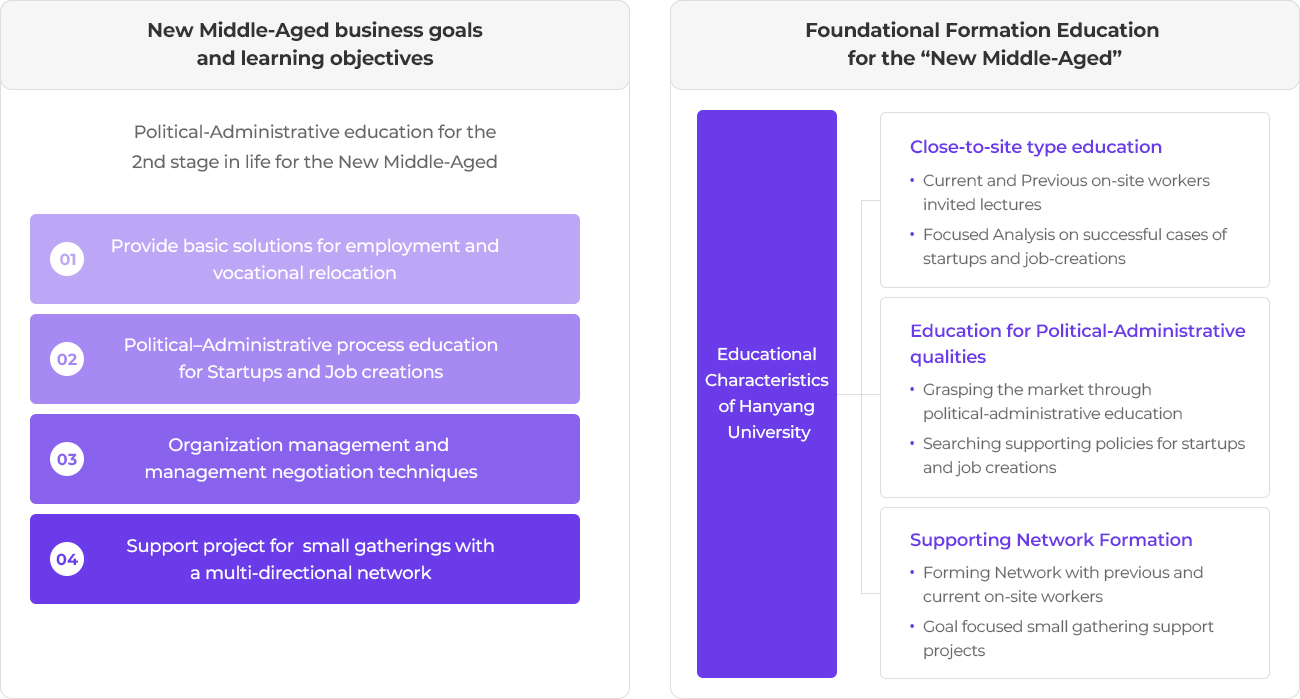Introducing Education Business
Social Change and the Importance of the "New Middle-Aged
South Korea is experiencing rapid population aging due to a combination of low birth rates and extended life expectancy brought about by advancements in medical technology. The working-age population (ages 15–64), which stood at 37.63 million in 2016, is projected to decline significantly to 20.62 million by 2065. This demographic shift highlights the accelerated aging of the workforce and underscores the importance of leveraging the human resources of the "new middle-aged" to sustain social growth and maintain the working-age population. The term "new middle-aged" was first introduced in August 2017 through the government’s 「Plan to Build a Foundation for a Three-Stage Life for the New Middle-Aged」. It refers to individuals around the age of 50 who are in a transitional phase, preparing for entrepreneurship, career changes, or re-employment. Historically, Korean society paid limited attention to this transitional working-age group. However, in the face of a declining working-age population, there is growing recognition of the "new middle-aged" as a valuable human resource. Their accumulated skills and experience are increasingly viewed as essential for enhancing national competitiveness and driving economic growth.

A Platform for Comprehensive Professional Education in Policy, Administration, Market Trends, and Organizational Management
The "new middle-aged" individuals have typically spent 20 to 30 years in the workforce since their initial employment, highlighting the need for reeducation to adapt to the social and market changes that have occurred during this time. In particular, entrepreneurship and job creation require flexible thinking to respond to evolving market conditions and technological advancements. This course aims to help participants understand the policy changes in South Korean society and the transformed market and technological environment. By acquiring foundational knowledge of policies and administration, participants will gain a deeper understanding of the societal changes and trends in Korea, enabling them to navigate these shifts more effectively.
Entrepreneurship and job creation based on new and creative ideas offer a highly viable career path for the "new middle-aged," who possess rich experience and social networks. To explore new professional opportunities, it is essential to thoroughly understand and evaluate the social environment that will help turn these ideas into reality. This program focuses on learning about the processes and support policies for entrepreneurship and job creation. By examining real-world cases of successful startups and career shifts, the course adopts an inquiry-based and practical approach, helping participants identify and explore pathways that will provide tangible support for their entrepreneurial ventures and job creation efforts.
The "new middle-aged" can be seen as the "middle" generation of South Korea, positioned between the MZ Generation (Millennials and Gen Z) and the post-war Baby Boomer generation. For this "middle" generation, effective communication requires a two-way, interactive approach, rather than a one-sided dynamic. By learning effective organizational management techniques and communication methods with external organizations, participants will understand how to leverage personal networks as valuable resources. This will help them acquire skills for managing human resources effectively, enhancing both individual and organizational success.
Real-World Analysis Through Successful Case Studies
Theory-based classes are essential for accumulating knowledge and broadening perspectives. However, theory alone cannot fully prepare individuals for the actual experiences in the workplace, nor can it effectively address unexpected situations that may arise during processes such as entrepreneurship, career transitions, or reemployment. This course emphasizes indirect education through the analysis of real-world cases, addressing the experiential aspects that theory alone cannot provide. Additionally, by examining successful cases of entrepreneurship, career changes, and reemployment, each subject will offer a foundational framework to help participants apply these lessons to their own experiences. Through this process, participants will be guided in building a strong foundation for creating their own career paths, from crafting resumes to accumulating practical case studies for various goals, ultimately assisting them in designing new, creative life trajectories.
